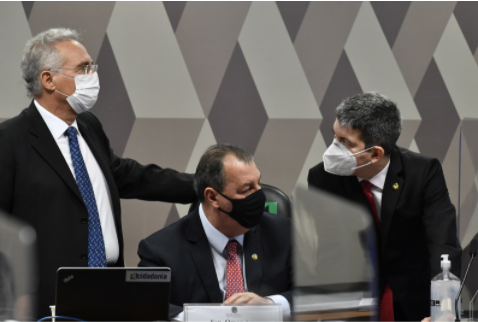After a month of installing the so-called Pandemic CPI, you have probably heard a lot about the subject. There are several hearings, people interviewed and new information revealed about the Federal Government's handling of the pandemic. But, tell us: do you actually know what a Parliamentary Commission of Inquiry is? How does it happen, what powers does it have?
According to political scientist and professor at IDP, Rafael Silveira, the CPI is one of the main instruments that the Legislative Branch has to control the actions of the Executive Branch, through the investigation of facts on any topic that determines an investigation of accountability. , whether from private or public sector actors. “The CPI can verify actions or lack of actions on the part of the government, it can investigate allegations of corruption and irregularities”, says the professor.
According to the legislation, the Parliamentary Commission of Inquiry has investigative powers typical of a judicial authority. “This means that the CPI investigates, inquires and collects evidence. This is the role of the commission”, explains IDP professor João Trindade, who is also a legislative consultant to the Senate and a lawyer.
Determined fact
The first information to be clear is that CPIs only investigate certain facts , which specify the commission's objective. “That is, when there is something specific to be investigated. A matter of a public nature that deserves political attention from deputies or senators”, details João. This means, for example, that it is not possible to form a commission to investigate a broad topic, such as corruption in general, but, in specific cases in which are suspected of corruption, yes.
“This serves both at a formal level, to be supported by the law, and also to facilitate the work of parliamentarians themselves in conducting activities in the direction of investigations”, points out Rafael Silveira.

Why and what is there CPI for?
Historically, commissions of this type were created to supervise the accounts of the kingdoms, as stated by IDP professor, João Trindade: “the primary function of Parliament, since the Low Middle Ages, was to supervise the accounts of the king and the Executive Branch. And today this is also done through CPI”, explains the professor.
Did you know that several historical events or events of great importance and repercussion were initiated by a Parliamentary Commission of Inquiry?
The impeachment of President Fernando Collor in 1992, for example, was a consequence of investigations carried out by the CPI of PC Farias, who had been treasurer in Collor's presidential campaign and acted as an intermediary between the business community and the government.
The Budget CPI, between 1993 and 1994, for example, “caused a huge impact on the way the budget was created in Brazil, including the way the Mixed Budget Committee worked as we know it today”, points out Rafael Silveira.
In 2005, the Correios CPI “investigated the payment of bribes within the Correios and ended up discovering a scheme to buy votes from parliamentarians, which became known as Mensalão ”, says professor João Trindade.
The CPI dos Correios investigation, in fact, had several political repercussions during President Lula's government. “The Lula government survived the CPI, but it was a major conflict during that period and the reports resulted in many legislative proposals”, comments Rafael Silveira.
More recently, the CPI on Violence against Women, in the Federal Senate, investigated the omission of public authorities in situations of application of the Maria da Penha Law, in 2012, investigating the fight against violence against women in all states in Brazil.
As Professor João Trindade explains, “the CPI on Violence against Women was faced with the lack of data on femicide in the country, simply because all femicides in Brazil were considered qualified homicides. The CPI proposed a specific classification of the crime of feminicide and, from then on, we began to have reliable statistics on the incidence of this crime in Brazilian law”.
However, teachers emphasize that not all Parliamentary Commissions of Inquiry reach conclusions of great repercussion or even complete their work. “Most of it doesn’t gain as much expression as we imagine”, explains Rafael.

Pandemic CPI
In the case of the Pandemic CPI, the purpose is to investigate the actions and omissions of the Federal Government in confronting the Covid-19 pandemic, mainly in the worsening of the health crisis in Amazonas in January this year, when there was a lack of oxygen in the city of Manaus.
It also seeks to raise possible irregularities in contracts, fraud in bidding, overpricing, diversion of public resources, signing of contracts with shell companies to provide generic or fictitious services, among other illicit acts, having used, for this purpose, resources from the Federal Union. In addition to investigating other actions or omissions committed by governments at federal, state and municipal level, during the new coronavirus pandemic.
According to professor Rafael Silveira, the Pandemic CPI ends up taking on a much larger dimension than any other “given the major problems that our society has faced and the weak, weak, irresponsible, poorly articulated and poorly managed manner of the State relatively to combat the pandemic”, he says.
When the number of deaths from Covid-19 already exceeds 460 thousand, “ it is absolutely important that the National Congress fulfills its supervisory role and investigates the management of the pandemic at the federal level, as it is a Congressional CPI, but, in relation to transfers of federal funds, that states and municipalities are also investigated”, highlights João Trindade.
The Pandemic CPI represents a fundamental moment in the fight against Covid-19 in Brazil. Therefore, the professor believes that “it is important mainly for the State itself to reorganize itself and take responsibilities to better lead the solution to this problem that we are still facing”, concludes professor Rafael Silveira.








